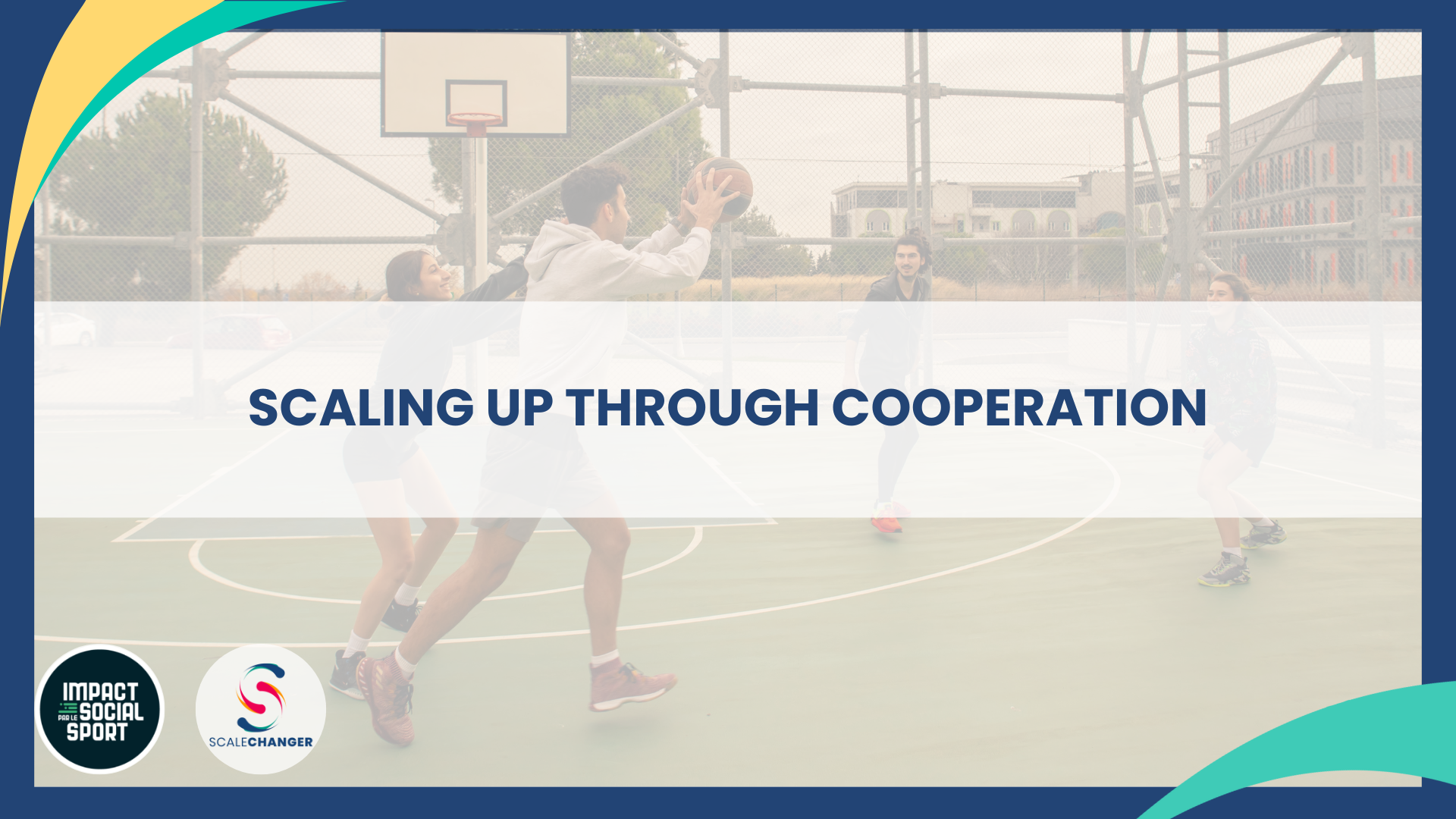Scaling up as a collective

Scaling up as a collective is a great way to amplify scale at large. Let us tell you why.
Over the past twenty years, social and solidarity economy (SSE) organisations have come under increasing pressure. This is mainly due to a sharp decline in public funding. In France, for example, subsidies fell by 41% between 2005 and 2020. Faced with this financial uncertainty, many SSE organisations turn to private funding. They seek support from foundations, corporate donors, and hybrid partnerships. Many also view cooperation as a way to grow and strengthen their impact.
Through strategic alliances, shared initiatives, or formal consortia, cooperation is gaining ground.
It enables resource sharing, broader impact, and collective solutions at scale.
A good example is the Social Impact through Sport (ISS) collective. Supported by ScaleChanger and AVISE (a French agency that promotes social innovation) it shows what structured cooperation can achieve.
Sport as a driver of social impact
The field of socio-sport refers to a set of activities that use sport and physical exercise as tools to achieve a wide range of social objectives. It brings together diverse practices, primarily targeting individuals facing multiple forms of vulnerability or specific difficulties. This field intersects with several areas of public policy, including education, social services, health, employment, territorial cohesion, integration, poverty reduction, justice, disability, equality, leisure, and sustainable development.
Although this sector is gaining increasing recognition, it still faces a number of structural challenges.
- Stakeholders work in silos and coordination is limited.
- Business models are fragile and often unsustainable.
- There is little shared expertise or strategy at national level.
It is within this context that the Social Impact through Sport consortium was created by three French pioneering organisations :
- Rebonds!, an association that uses sport for education and social integration.
- DAHLIR, an association that supports social inclusion through sport and leisure pathways.
- Breizh Insertion Sport, an association that promotes health, reintegration, and civic values, especially for youth in deprived areas.
With financial support from the Ministry of Sports, the National Agency for Territorial Cohesion (ANCT), and the National Resource Centre for Sport and Innovation (PRNSI), the consortium was able to swiftly expand its work. These financial aids enabled the group to build and share both practical and theoretical knowledge, in collaboration with academic research teams specialising in sociology.
Together, the member organisations of the consortium are committed to strengthening cooperation in order to develop and formalise expertise in the field of socio-sport, and to make this expertise accessible to any stakeholder wishing to implement socio-sport initiatives that respond to the needs of the most vulnerable members of society.
Ambitions of the consortium and first challenges
From the outset, Social Impact through Sport set itself the mission of co-developing and disseminating tools for public authorities, educators, and social actors, with the aim of advancing the socio-sport sector and promoting its social value. The project quickly brought together other organisations with similar ambitions, leading to the formation, in early 2024, of a collective of eight member organisations.
As the collective grew, the first challenges emerged, particularly the need for closer cooperation within a formal legal framework. It became essential to establish a more structured model of collaboration, allowing both founding members and newcomers to align on shared objectives, define commitments, roles and responsibilities, and clarify how each organisation would participate. This formal structure also aimed to facilitate the establishment of agreements with key strategic partners.
In response, the consortium decided to transition towards a more structured form of collaboration by creating a dedicated legal entity.
From an informal consortium to a structured organisation: the role of ScaleChanger
ScaleChanger contributed to the thinking and planning processes that led to this new cooperative framework and the creation of a dedicated legal structure.
ScaleChanger guided the ISS members through key steps in this transition, including:
- Producing a shared diagnostic involving all eight member organisations, clarifying the consortium’s positioning, distinctiveness, and objectives;
- Developing a joint roadmap to structure the collaboration within the new legal entity, step by step;
- Supporting the creation of a shared charter (vision, mission, areas of activity, ambition, values, principles of action, etc.);
- Assisting in projecting the future budget of the new organisation under several scenarios;
- Supporting the design of a target organisational and governance model for ISS, in collaboration with experts from the Impact Lawyers collective, a group specialising in legal support for social impact organisations.
This work was carried out through three collective seminars (organised by Avise), along with working sessions involving the leadership teams of each member organisation throughout the process.
In addition, with legal support from Impact Lawyers, the members finalised the creation of a dedicated association, designed to structure their cooperation, secure their growth, and collectively manage future projects, partnerships, funding, and recruitment.
An inspiring model for the social and solidarity economy
The experience of ISS highlights several key lessons for SSE actors seeking to scale up their impact while responding collectively to a social or environmental challenge without needing significant financial resources. When properly structured, cooperation becomes a strategic lever to:
- Strengthen the credibility and legitimacy of cooperating organisations: a shared framework reassures funders, lends credibility to projects supported by multiple entities, and amplifies the voices of members through joint positions.
- Increase visibility: cooperation enables organisations to speak with one voice and to share their initiatives, expertise, and practices more widely.
- Pool resources and enhance coordination between projects: by encouraging the sharing of skills and collaboration across networks, cooperation allows for the pooling of human resources, the strengthening of synergies, and the alignment of fragmented initiatives under a shared direction.
Foster mutual support and trust: beyond tangible results, structured cooperation provides a valuable framework for peer support and solidarity.
How to make it work? Key success factors
To conclude, the ScaleChanger team offers a few transferable recommendations for building successful alliances across sectors:
- Anchor the cooperation in a clear, collectively endorsed vision and shared objectives.
- Consider the specific contexts and constraints of each organisation and individual involved, and encourage human connection beyond operational and institutional ties.
- Formalise the operational arrangements of the collaboration, taking into account that each organisation is unique, has their own capacities and that there may be different levels of involvement.
- Build a shared culture rooted in trust, transparency, and mutual commitment.
Are you part of an alliance or looking to structure one in your sector? ScaleChanger can support you at every stage:
- Cooperation diagnostics
- Strategic alignment
- Facilitation of peer-to-peer exchanges
- Structuring organisational and governance models
- Formalising the cooperation’s economic model
etc,
To find out more
📙 Discover our article on sport as a driver of social transformation here.
Need support in clarifying and defining your strategic priorities? 👉contact@scalechanger.org
Date : 27 June 2025

